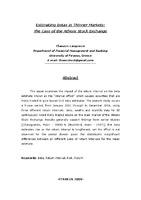| dc.contributor.author | Λαμπούσης, Αθανάσιος Ι. | |
| dc.date.accessioned | 2008-09-29T07:20:20Z | |
| dc.date.available | 2008-09-29T07:20:20Z | |
| dc.date.issued | 2008-09-29T07:20:20Z | |
| dc.identifier.uri | https://dione.lib.unipi.gr/xmlui/handle/unipi/2653 | |
| dc.description.abstract | This paper examines the impact of the return interval on the beta
estimate known as the “interval effect” which causes securities that are
thinly traded to give biased OLS beta estimates. The present study covers
a 5-year period, from January 2002 through to December 2006, using
three different return intervals: daily, weekly and monthly data for 60
continuously listed thinly-traded stocks on the main market of the Athens
Stock Exchange. Results generally support findings from earlier studies
[(Diacogiannis, Makri - 2008) & (Brailsford, Josev - 1997)] that beta
estimates rise as the return interval is lengthened, yet the effect is not
observed for the period chosen given the statistically insignificant
differences between all different pairs of return intervals for the mean
estimate. | |
| dc.language.iso | el | |
| dc.rights | Αναφορά Δημιουργού-Μη Εμπορική Χρήση-Όχι Παράγωγα Έργα 4.0 Διεθνές | |
| dc.rights.uri | http://creativecommons.org/licenses/by-nc-nd/4.0/deed.el | |
| dc.subject | Stocks -- Prices | |
| dc.subject | Stock price forecasting | |
| dc.subject | Χρηματιστήριο Αξιών Αθηνών | |
| dc.title | Estimating betas in thinner markets : "the case of the Athens stock exchange" | |
| dc.type | Master Thesis | |
| europeana.isShownAt | https://dione.lib.unipi.gr/xmlui/handle/unipi/2653 | |
| europeana.type | IMAGE | |
| dc.identifier.call | 332.63 ΛΑΜ | |



